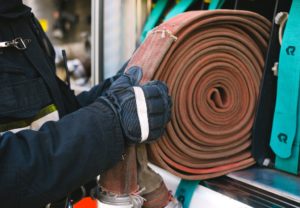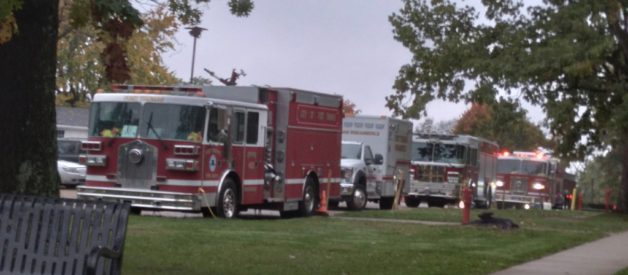All around the fire engine, red and white lights flashed a lively dance. I couldn’t miss them as I walked by a lot in the park. Half a dozen other emergency vehicles were also there. The park has been their temporary home for several months while the firehouse and connecting city building undergo renovations.

The flashing fire engine was going through a maintenance check. The lights seemed to be working properly. A fireman worked along one side of the vehicle, possibly doing a walk-around, which is a systematic method of inspection to make sure nothing is skipped. Firemen have a lengthy list of things to check regularly—some monthly, many weekly, and others daily. Everything has to be in perfect working condition, and all the supplies must be precisely where they belong. Firemen never know when they will get a call, so they and their trucks and equipment must always be ready.
As I watched, I was reminded of Peter’s teaching to the Jewish Christians: Always be prepared to give an answer to everyone who asks you to give the reason for the hope that you have (1 Peter 3:15). I began thinking about what exactly I’m supposed to be prepared for and how I can be ready.
What to Prepare For
If we are true believers in Jesus Christ, he is our hope, and Peter says we need to be ready “to give an answer” for that hope. Some Bible translations use defense in place of answer, which gives us a clearer picture of what is meant because the Greek word apologia refers to a speech in defense, particularly in a law court (Strong’s Concordance).

We get our word apology from this Greek word, but in classical times it had nothing to do with being sorry for something you did wrong. It was a reasoned defense to present proof. So apologia means “a well-reasoned reply; a thought-out response to adequately address the issue(s) that is raised” (HELPS Word-studies). That is what is meant by giving an answer.
When someone questions how we can have peace in the midst of a crisis, we should be able to clearly state where our hope comes from. When they ask why we believe certain things that go against the present culture, we are to be prepared to defend those beliefs. Although apologia referred to a legal defense in an ancient court, we don’t need formal points precisely written out or eloquently spoken. When Peter included “to everyone,” he showed he was “thinking of informal answers on any suitable occasion” (Pulpit Commentary).
How to Prepare
Then how can we prepare ourselves to have the answers we need at any given time? Even if we have strong beliefs, we may have difficulty explaining why we believe.

As followers of Christ, our beliefs come from God’s teachings, which are found in the Bible. If I don’t know what God says about something, I have no truth with which to defend my beliefs. It’s like a piece of equipment left off the fire engine. If it isn’t there when the truck gets to the scene, the firemen can’t pull it out to use it.
If we have acquired the knowledge, though, the Holy Spirit can find it for us. Before Jesus returned to heaven, he told his disciples, “But the Counselor, the Holy Spirit, whom the Father will send in my name, will teach you all things and will remind you of everything I have said to you” (John 14:26).
So one way we can prepare ourselves to give an answer is to read the Bible. Become familiar with God’s whole story. We can skip around or read it from cover to cover. But always be engaged in learning more for the Holy Spirit to “remind you of.”

It’s also great preparation to memorize scripture because then those evidences for what we believe will be even handier for the Holy Spirit to bring to our remembrance. On the fire truck, the equipment needed most often is stored in the most accessible location for retrieval.
Another preparation is to go beyond just reading the Bible. Study it to better understand God’s teachings. You can join a Bible study or study on your own. There is no lack of books to help you dig deeper into books of the Bible or do topical studies. Or you can just sit down with the Bible and ask the Holy Spirit to instruct you. After all, he is our teacher (John 14:26).

Many people may seek answers from us concerning cultural issues. Why do we hold the beliefs we do about marriage or abortion or even voting? Our beliefs must be grounded in the truth of God’s Word, and we need to be able to articulate them. I recently discovered the website Center for Biblical Worldview. Besides articles, videos, and a weekly blog, there are four brochures available that teach biblical principles for relevant topics. They were created to help “Christians fulfill the exhortation of 1 Peter 3:15 to always be prepared to make a defense for what we believe.” Complete and abridged versions of each brochure can be downloaded free.
Part of preparing the fire truck is regular washing. Firemen do this at least once a week, more often if necessary. Besides wanting to represent the department well to the public, they have a very practical reason. It reveals any damage or other issues that need to be fixed.
In teaching about Jesus and the Church, Paul said, 25”…Christ loved the church and gave himself up for her 26to make her holy, cleansing her by the washing with water through the word” (Ephesians 5:25-26). Cleansing here means to purify morally. Paul is referring to Jesus being the Word (John 1:1) and giving his life on the cross to cleanse us from our sin. But I think the written Word also provides a regular cleansing of our hearts. As we read and study it, it reveals attitudes in us that don’t line up with God’s teachings so they can be fixed. We need this regular washing through the Word because how we present our defense of the truth is important.

Paul addressed attitude following his teaching to be prepared. “But do this with gentleness and respect” (1 Peter 3:15). I had to laugh when I read a line in a fire truck maintenance checklist I saw online: DO NOT check the siren in the station. I can imagine what would happen if that instruction was not heeded. Those present would not be able to hear anything for a week.
Such is the case if we answer someone’s questions with an argumentative, irritating, pushy, or know-it-all attitude. Even if we speak truth, it will sound like that siren inside the fire station. Our questioner most likely will become spiritually hearing impaired—not only for that moment, but perhaps for a very long time afterward.
Most of us aren’t Bible scholars. We won’t have answers for everything. But we can study God’s Word to intelligently defend what we believe. Then those seeking reasons can see that our beliefs are solid, not based on a feeling or tradition or what someone else once told us.
Just as the preparation of a fire engine is regular and ongoing, we need to constantly attend to our preparation for giving an answer for the hope we have.
Scripture quotations are from NIV.
Greek definitions and commentary notes are from Bible Hub. See Resources.




Angie Camp
November 12, 2021Read God’s Word. Memorize it. Study His Word. That is really how to defend our beliefs in a nutshell! Angie
bspencer
November 12, 2021Thanks, Angie. Sounds simple, doesn’t it? From personal experience, the hardest part is just choosing to do it.
Dolores R. Birkle
November 14, 2021I loved the way you explained it, Bonnie, likened to a firetruck, always having to be ready and prepared. Thanks be to God that we have the Holy Spirit, always with us!!
bspencer
November 14, 2021Thank you, Dolores. Yes, how wonderful that we constantly have the Holy Spirit, our Helper, that Jesus asked his Father to give us. We are so loved!
Brenda Murphy
November 15, 2021I learned this the hard way. I began a “simple” Bible study with 3 neighbors, and the first meeting one of them challenged everything I said. I knew what the Bible said the answer was but I had no idea where it was found, and couldn’t defend myself. It was a lesson in both humility and preparation. Good article Bonnie, and a great reminder. 🙂
bspencer
November 15, 2021Thank you, Brenda. That is a hard lesson.
At least with the internet so handy today, we are close to a source to help us find the exact scripture if something unexpected comes up in a discussion. But I’m glad that God doesn’t expect us to “know everything.”
Brenda Murphy
November 15, 2021Yes, the internet would have definately helped, lol.